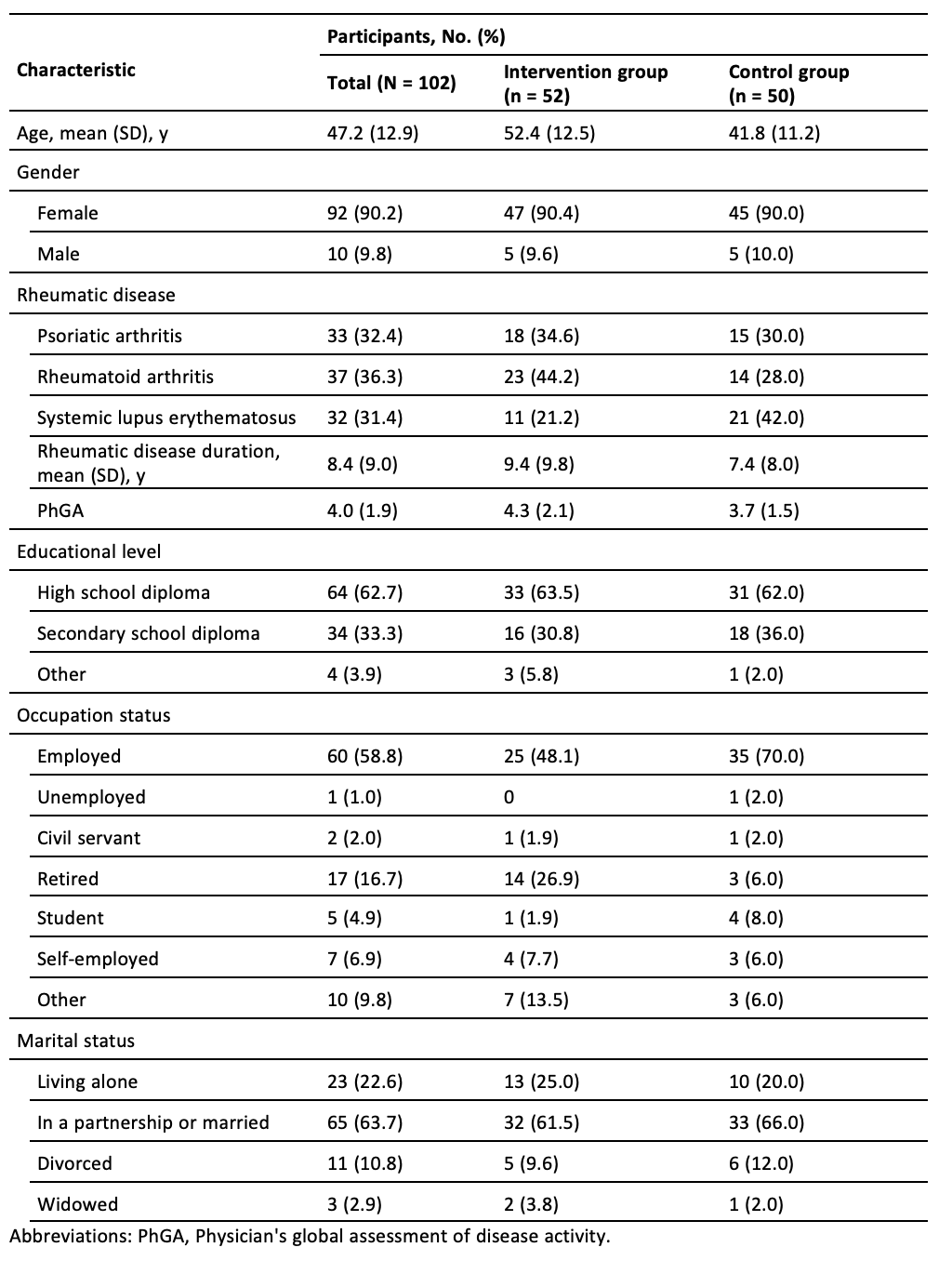Session Information
Session Type: Abstract Session
Session Time: 2:00PM-2:15PM
Background/Purpose: Patients with inflammatory rheumatic diseases (IRDs) frequently experience psychological distress, however access to psychological support remains limited. The aim of this trial (DRKS identifier: DRKS00032862) was to investigate the effectiveness of a digital psychological intervention for individuals with IRDs.
Methods: Participants aged 18 years or older were recruited across Germany between February 22, 2024 and June 4, 2024 if they had been diagnosed with rheumatoid arthritis (RA), psoriatic arthritis (PsA), or systemic lupus erythematosus (SLE) and reported psychological distress and reduced quality of life. Participants were randomized to either a self-guided digital psychological intervention or a treatment as usual control condition. The primary outcomes were change in psychological distress (Hospital Anxiety and Depression Scale [HADS]) and quality of life (Assessment of Quality of Life [AQoL-8D]) from baseline to three months. Secondary outcomes included changes in self-efficacy, health literacy, perceived stress, functional impairment, depression and anxiety.
Results: A total of 102 participants (mean [SD] age, 47.2 [12.9] years; 92 [90.2%] female; see Table 1) were randomized to the intervention group (n = 52) and the control group (n = 50) (Fig.1). The intervention group showed a significantly greater reduction in psychological distress at the 3-month follow-up (least squares mean difference, −3.60; 95% CI, −5.73 to −1.47; P < .001; Cohen’s d = -0.71), and a greater improvement of quality of life (least squares mean difference, 0.04; 95% CI, 0.00 to 0.09; P = .047; Cohen’s d = 0.49) (Fig.2). A significantly greater proportion of participants in the intervention group experienced a clinically meaningful improvement in psychological distress (59.2% vs. 34.0%, P = .016) and quality of life (55.1% vs 32.0%, P = .026) compared to the control group. Secondary outcomes measures showed a similar pattern of improvement, except for functional impairment. No adverse events related to the intervention were reported.
Conclusion: This randomized clinical trial supports the effectiveness and safety of a digital psychological intervention in individuals with IRDs. These findings suggest that such digital interventions could be a valuable, scalable approach to addressing mental health needs in rheumatology.
 Figure 1. Trial Participant Flow Diagram
Figure 1. Trial Participant Flow Diagram
.jpg) Figure 2. Least-squares Mean Changes of Primary Outcome Measures
Figure 2. Least-squares Mean Changes of Primary Outcome Measures
.jpg) Table 1. Baseline Characteristics (Intention-to-Treat Sample)
Table 1. Baseline Characteristics (Intention-to-Treat Sample)
To cite this abstract in AMA style:
Knitza J, Kraus J, Krusche M, Haase I, Klemm P, Hueber A, Alexander P, Drott U, Kuhn S, Klein J. Digital Psychological Support for Inflammatory Rheumatic Diseases: A Randomized Clinical Trial [abstract]. Arthritis Rheumatol. 2025; 77 (suppl 9). https://acrabstracts.org/abstract/digital-psychological-support-for-inflammatory-rheumatic-diseases-a-randomized-clinical-trial/. Accessed .« Back to ACR Convergence 2025
ACR Meeting Abstracts - https://acrabstracts.org/abstract/digital-psychological-support-for-inflammatory-rheumatic-diseases-a-randomized-clinical-trial/
